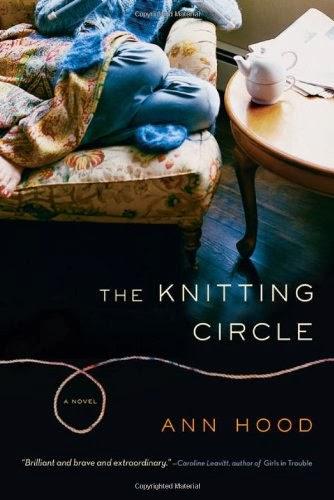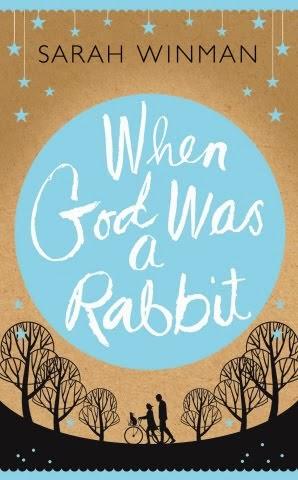No. No I did not. Let me tell you, the very first time you run an Act and you are trying to figure out lines, movements, reactions, read from your book, turn pages and make notes, working out how to knit after a hasty lesson from the actress playing your big sister is not the easiest thing to do. However I mastered it* (after a lot of practice - it was a good excuse to watch Happy Feet 2) and now am knitting merrily away whilst talking, moving and acting. Howzat for multitasking?
*by mastering it I mean I can do lots and lots of straight lines. That's it. Don't ask me to turn a corner.
The Knitting Circle
 Anyway all that knitting made me return to a book I had read a while ago but hadn't picked up again since. The Knitting Circle by Ann Hood is a gentle, melancholic and quite emotional tale of a woman who has just lost her only child to meningitis. Her marriage is breaking down, she is bitter towards her distant mother and she is on the verge of losing her job as a writer for the local paper. In a desperate bid to try and find some structure and support in her life she joins a knitting circle. The women welcome her in and gradually open up to her, each with their individual own tales of grief and woe, their talk accompanied by the clack of knitting needles as they each work through their own private stages of grief and healing.
Anyway all that knitting made me return to a book I had read a while ago but hadn't picked up again since. The Knitting Circle by Ann Hood is a gentle, melancholic and quite emotional tale of a woman who has just lost her only child to meningitis. Her marriage is breaking down, she is bitter towards her distant mother and she is on the verge of losing her job as a writer for the local paper. In a desperate bid to try and find some structure and support in her life she joins a knitting circle. The women welcome her in and gradually open up to her, each with their individual own tales of grief and woe, their talk accompanied by the clack of knitting needles as they each work through their own private stages of grief and healing.The novel has a poignancy about it, made even more so when you realize that the author, Hood, is writing this from a semi-autobiographical viewpoint as she lost her daughter to an aggressive form of strep five years earlier. I found it to be a beautiful read, and not one that you need to be familiar with knitting terminology or process to enjoy. It is incredibly raw and powerful and the author gives an intense portrayal of grief and the loss of self that comes along with it. If you are still going through a grieving process yourself though, you may wish to wait awhile before picking this book up.
When God Was A Rabbit
 This glorious novel chronicles the life of the precocious Elly Maud as she moves from child to womanhood and her observations about life and family around her.
This glorious novel chronicles the life of the precocious Elly Maud as she moves from child to womanhood and her observations about life and family around her.Elly is from a loving, stable, if slightly unconventional family and enjoys a close relationship with her older brother, Joe, who buys her a pet rabbit she names god (small 'g')after her family moves to a picturesque cottage in Cornwall which they turn into a B&B, attracting eccentric guests in the late 1960's. Despite her idyllic environment and family, Elly still sees the darker sides of life; from death and loss to her brother's difficulties in fitting in with his peers, her mother's bouts of depression and darker hints at abuse by a neighbor. Then there is Jenny Penny, Elly's best friend and pen pal who is from a home that is a lot lonelier and more dangerous than Elly's own and who is often an outsider, gazing in wistfully at Elly's life. As the book progresses we shift to the 1990's. Joe has moved to New York, Elly is a journalist and Jenny Penny is in prison. The prose here also grows up, it doesn't have that misty, magical hue over it anymore and this helps to see the transition in Elly from observant yet idealistic young girl to fairly cynical young woman.
There is a beautiful mix of humour, whimsy and sadness throughout the book; the nativity scene in particular is hilarious and the commentary on real world events (the description of the events of 9/11 in particular is incredibly gritty) has a grounding effect for the reader. There are some extremely powerful narratives as well; Alfie sitting in his car having quit as a lawyer is notably moving. You get a real feel for the characters as they explore their worlds and their relationships, mixed with a pathos for a time of lost innocence and youth, when God Was A Rabbit.
